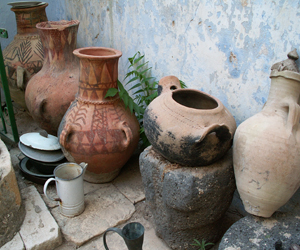Livnot U'lehibanot
Nestled in a corner of the Old Jewish Quarter of Tzfat, you can find a Jewish Experience Program like no other. Livnot U'Lehibanot, "To Build and Be Built" was established in 1980 to give young Jewish adults an opportunity to explore their Jewish heritage on their own terms, through experiences and hands-on activities.
How It Began
The beginnings of Livnot, as its participants call it, were in a small corner near the home of Livnot's founders, Miriam and Aharon Botzer. Newlyweds themselves, the Botzers had begun to excavate the ruin which they had bought to be their home. As they slowly dug out and renovated their own home, Aharon and Miriam noticed that passing backpackers were fascinated with the process, and from there, the idea of a non-religious Jewish identity program came into focus. Through the years, Livnot has slowly acquired more ruins, which the participants, under the supervision of professionals, excavate and renovate. Today, these rooms, once the homes of families who lived in Tzfat hundreds of years ago, serve as the Livnot campus.
The Program
The core program, once only lasting for 3-month periods, today offers programs spanning from 2 weeks to 5 months. Each program, no matter what the length, includes a wide variety of experiential and interactive activities. Livnot's hiking component is probably the most popular component of all Livnot programs. Livnot staff take the participants on some of Israel's most beautiful and unspoiled trails, both in the North of Israel and in the desert. Much of the formal "teaching" of Livnot takes place during these hikes, as participants walk, climb, swim, and bike through the Land.
Before "Tikkun Olam" became a byword for Jewish activism, all of Livnot's programs were involved in volunteerism. Livnot participants helped Ethiopian immigrants who had just arrived at the local Absorption Centers, painted and fixed the homes of elderly and disadvantaged residents of Tzfat (and later, Jerusalem, when a campus opened there), built public parks, repaired and painted schools and kindergartens, and worked with the municipality on many other public service projects. After the Second Lebanon War, Livnot took on the responsibility of renovating bomb shelters in cities of Tzfat, Hatzor and Kiryat Shmoneh, and Livnot Galilee Fellowship participants were at the forefront of this work.
Jewish Studies
Livnot's workshops and seminars are designed to be interactive and experiential, giving participants the opportunity to become involved in the process of learning about various aspects of Judaism and Israel. For instance, Livnot teaches about Judaism and the environment through modeling a Tu B'Shevat Seder. The concept of belonging to a Jewish community is shown by involving the participants in the Tzfat community, meeting local residents and workers, and celebrating Shabbat with Tzfat families. The final, and most important component of any Livnot program, is Shabbat celebration. For Livnot, Shabbat is the culmination of the week – everything that the group does throughout the week leads towards Shabbat. Thursday nights and Fridays are filled with Shabbat preparations, as the participants prepare the food themselves, make the challahs, and get ready to do their own d'var Torahs at Friday night dinner. Kabbalat Shabbat, singing and dancing on Livnot's porch facing the sunset over Mt. Meron, is an experience that is not quickly forgotten, and Saturday lunches are an opportunity for the participants to get together with local Tzfat families.
As Livnot prepares to celebrate 30 years of changes and development, it anticipates many more years of, as its staff believes, serving the Jewish People with a unique opportunity that opens the doors of Judaism to many people who would otherwise not even peek through the window.

